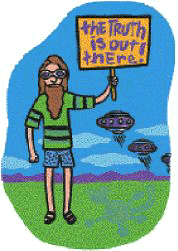 | |
|
Aliens raised me!
There's science, and then there's junk science. And much of the time few of us can tell the difference. Humans abducted by aliens, crop circles made by extraterrestrial spacecraft, cell phones promoting brain cancer. The list goes on. Actually, our gullibility isn't all that surprising, suggests Glendon psychology professor James Alcock, who teaches a course on belief. He says our age has largely supplanted religion with science as the foundation of our belief systems. "We tend to put science on a pedestal," he says. The trouble is, too much of what we accept as scientific fact is based on nothing of the kind. In the 1970s a general fascination with the paranormal and with other junk science phenomena took hold. It was a time when people were searching for something "to give meaning to life," Alcock suggests. He says the interest in junk science was prompted by widespread societal changes such as family breakdown and a steep decline in church attendance. Pseudo-science became so prevalent that "some airlines started using bio-rhythms with their pilots, based on their birthdays and, in at least one case, a judge in the U.S. was sentencing people based on their horoscopes," says Alcock. The rise of pseudo-science has continued into the 1990s with shows such as the "X-Files," largely successful due to a widespread lack of scientific literacy. He says people need to be equipped to deal with the barrage of information they now receive. "I think the root problem is not the presence of nonsense in the media, it's the lack of people's critical thinking skills." Alcock is a member of the U.S.-based Committee for the Scientific Investigation of the Claims of the Paranormal (CSICOP) which publishes The Skeptical Inquirer, a kind of junk science consumer report. While he thinks it's important to discredit pseudo-science, Alcock makes it clear that he doesn't consider himself a crusader. Scientists, too, make mistakes, he says. "We're all vulnerable to pockets of irrationality in our belief systems." Still skeptical? Visit CSICOP's web site @ http://www.csicop.org. |
|
Text Menu [ Home | Past Issues | Subscriptions | Contact Us | Site Map | Search Profiles ] |
